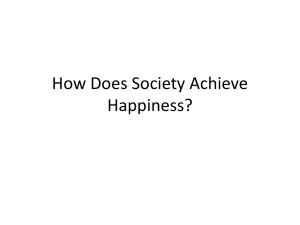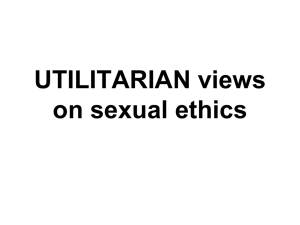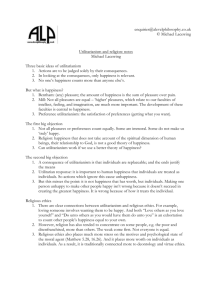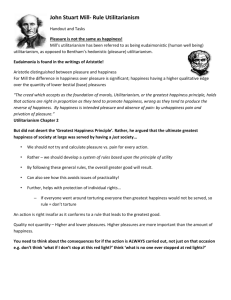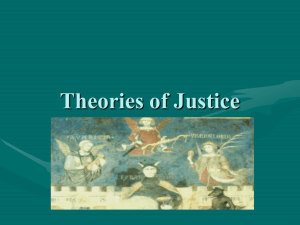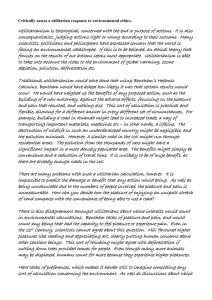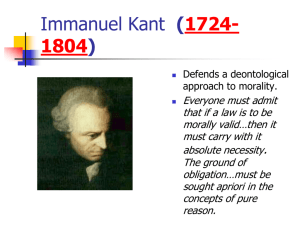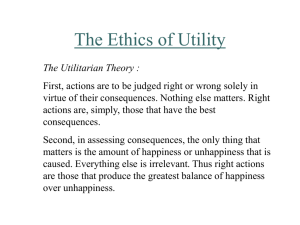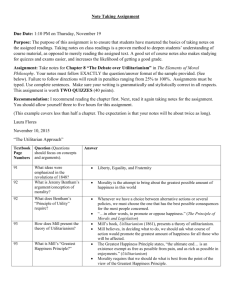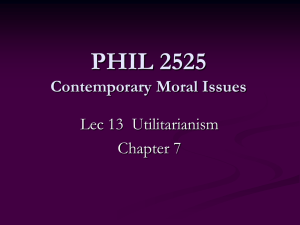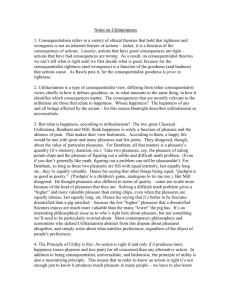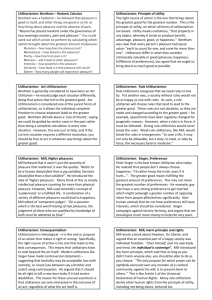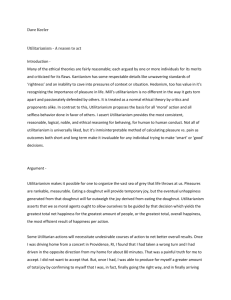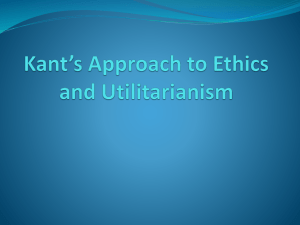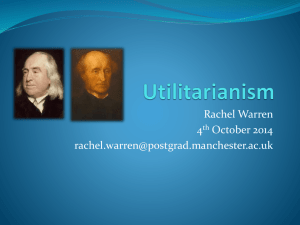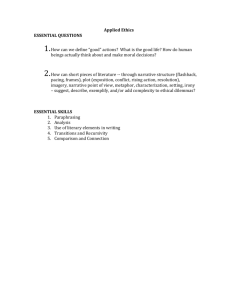Utilitarianism
advertisement
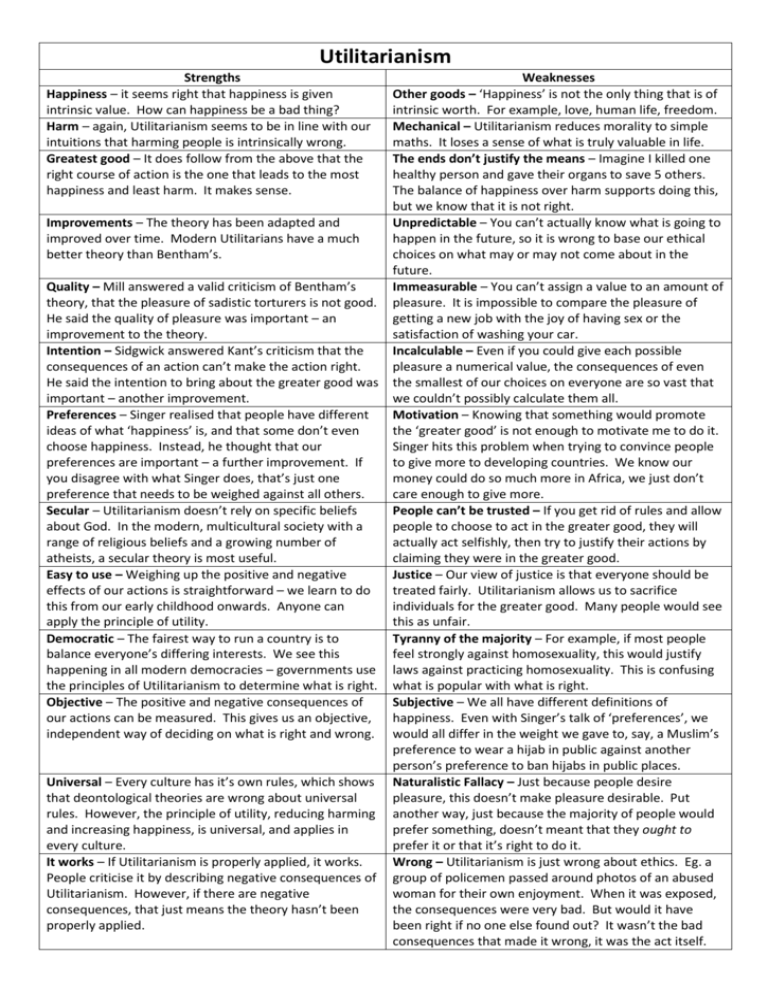
Utilitarianism Strengths Happiness – it seems right that happiness is given intrinsic value. How can happiness be a bad thing? Harm – again, Utilitarianism seems to be in line with our intuitions that harming people is intrinsically wrong. Greatest good – It does follow from the above that the right course of action is the one that leads to the most happiness and least harm. It makes sense. Weaknesses Other goods – ‘Happiness’ is not the only thing that is of intrinsic worth. For example, love, human life, freedom. Mechanical – Utilitarianism reduces morality to simple maths. It loses a sense of what is truly valuable in life. The ends don’t justify the means – Imagine I killed one healthy person and gave their organs to save 5 others. The balance of happiness over harm supports doing this, but we know that it is not right. Improvements – The theory has been adapted and Unpredictable – You can’t actually know what is going to improved over time. Modern Utilitarians have a much happen in the future, so it is wrong to base our ethical better theory than Bentham’s. choices on what may or may not come about in the future. Quality – Mill answered a valid criticism of Bentham’s Immeasurable – You can’t assign a value to an amount of theory, that the pleasure of sadistic torturers is not good. pleasure. It is impossible to compare the pleasure of He said the quality of pleasure was important – an getting a new job with the joy of having sex or the improvement to the theory. satisfaction of washing your car. Intention – Sidgwick answered Kant’s criticism that the Incalculable – Even if you could give each possible consequences of an action can’t make the action right. pleasure a numerical value, the consequences of even He said the intention to bring about the greater good was the smallest of our choices on everyone are so vast that important – another improvement. we couldn’t possibly calculate them all. Preferences – Singer realised that people have different Motivation – Knowing that something would promote ideas of what ‘happiness’ is, and that some don’t even the ‘greater good’ is not enough to motivate me to do it. choose happiness. Instead, he thought that our Singer hits this problem when trying to convince people preferences are important – a further improvement. If to give more to developing countries. We know our you disagree with what Singer does, that’s just one money could do so much more in Africa, we just don’t preference that needs to be weighed against all others. care enough to give more. Secular – Utilitarianism doesn’t rely on specific beliefs People can’t be trusted – If you get rid of rules and allow about God. In the modern, multicultural society with a people to choose to act in the greater good, they will range of religious beliefs and a growing number of actually act selfishly, then try to justify their actions by atheists, a secular theory is most useful. claiming they were in the greater good. Easy to use – Weighing up the positive and negative Justice – Our view of justice is that everyone should be effects of our actions is straightforward – we learn to do treated fairly. Utilitarianism allows us to sacrifice this from our early childhood onwards. Anyone can individuals for the greater good. Many people would see apply the principle of utility. this as unfair. Democratic – The fairest way to run a country is to Tyranny of the majority – For example, if most people balance everyone’s differing interests. We see this feel strongly against homosexuality, this would justify happening in all modern democracies – governments use laws against practicing homosexuality. This is confusing the principles of Utilitarianism to determine what is right. what is popular with what is right. Objective – The positive and negative consequences of Subjective – We all have different definitions of our actions can be measured. This gives us an objective, happiness. Even with Singer’s talk of ‘preferences’, we independent way of deciding on what is right and wrong. would all differ in the weight we gave to, say, a Muslim’s preference to wear a hijab in public against another person’s preference to ban hijabs in public places. Universal – Every culture has it’s own rules, which shows Naturalistic Fallacy – Just because people desire that deontological theories are wrong about universal pleasure, this doesn’t make pleasure desirable. Put rules. However, the principle of utility, reducing harming another way, just because the majority of people would and increasing happiness, is universal, and applies in prefer something, doesn’t meant that they ought to every culture. prefer it or that it’s right to do it. It works – If Utilitarianism is properly applied, it works. Wrong – Utilitarianism is just wrong about ethics. Eg. a People criticise it by describing negative consequences of group of policemen passed around photos of an abused Utilitarianism. However, if there are negative woman for their own enjoyment. When it was exposed, consequences, that just means the theory hasn’t been the consequences were very bad. But would it have properly applied. been right if no one else found out? It wasn’t the bad consequences that made it wrong, it was the act itself.

